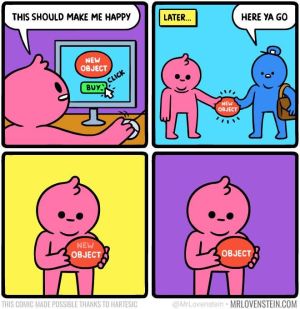Materialism
Materialism: More than Just Stuff, a Trap for Your Future
In a world overflowing with "buy now, pay later" schemes and social media feeds showcasing the latest must-haves, it's easy to fall prey to materialism. But for those yet to climb the property ladder, clinging to possessions might be hindering your true potential.
Materialism isn't just about the latest gadgets or designer clothes. It's a deep-seated belief that possessions define your worth and happiness. While closely related to consumerism, it extends beyond simply buying things. It's about attaching your identity and self-esteem to acquiring and owning material possessions.
The Siren Song of Consumerism
Just like sirens luring sailors to their doom, consumerism bombards us with temptations, using targeted advertising, social media influencers, and carefully crafted marketing to fuel our desires. This creates a never-ending cycle of wanting more, often leading to impulsive purchases and debt.
Stimulus Check: From Helping Hand to Shopping Spree
Remember the economic stimulus checks implemented during the pandemic? While intended to aid struggling individuals, research suggests a significant portion ended up boosting the profits of online retailers. This highlights how easily materialistic tendencies can redirect resources meant for essential needs towards non-essential wants.
Breaking Free: Reclaiming Your Self-Worth
So, how do we break free from the materialism trap? Here are a few steps:
- Identify your values: What truly matters to you? Is it relationships, experiences, personal growth, or something else entirely? Defining your core values helps you distinguish between "wants" and "needs."
- Practice gratitude: Shift your focus to appreciating what you already have, focusing on experiences and moments instead of material possessions.
- Challenge instant gratification: Before buying something, ask yourself: "Will this genuinely improve my life? Will it bring me lasting happiness?" Delaying impulse purchases often reveals their fleeting appeal.
- Embrace experiences: Invest in enriching experiences like travel, learning new skills, or spending time with loved ones. These create lasting memories and true fulfillment.
- Connect with like-minded people: Surround yourself with individuals who value experiences and purpose over material possessions. Their perspectives can be a powerful source of support.
Remember, breaking free from materialism is a journey, not a destination. Be patient, celebrate your progress, and enjoy the freedom that comes with prioritizing what truly matters in life. Your happiness and well-being are worth more than any possession.
Shower Thoughts on Materialism
The Illusion of Material Love
Standing here, the warm water cascading down, a chilling thought hits me: the sheer volume of plastic I've consumed in my lifetime. From the countless plastic bottles I've guzzled down to the mountains of packaging that have piled up in landfills, it's a staggering number.
I think of the plastic toys I played with as a child, the disposable cutlery I used at countless picnics, the endless stream of plastic bags that have filled my kitchen drawers. And that's just me. Multiply that by the billions of people on this planet, each with their own plastic footprint, and the scale of the problem becomes truly terrifying.
We are leaving behind a plastic ghost, a silent testament to our insatiable consumption. This isn't just about the plastic itself, though. It's a symptom of a deeper issue: our obsession with material possessions.
We're told that owning things will bring us happiness. Bigger houses, faster cars, the latest gadgets – these are the markers of success in our society. But is this true happiness, or is it an illusion created by a relentless cycle of consumerism?
The production of these "desirable" goods comes at a steep environmental cost. The extraction of raw materials, the manufacturing processes, and the transportation of goods all leave a significant carbon footprint. Mining for metals like lithium for batteries requires vast amounts of water and can have devastating environmental impacts. The production of cement, a key ingredient in construction, is an energy-intensive process that contributes significantly to greenhouse gas emissions.
We are chasing a mirage of happiness, fueled by a system that prioritizes profit over sustainability. We are sacrificing the planet for fleeting moments of gratification.
What can I do? Recycle more diligently? Sure. But is it enough? This isn't just about individual responsibility; it's a systemic issue. We need to rethink our entire relationship with consumption, to prioritize experiences over possessions, and to demand a more sustainable and equitable economic system.
The time for action is now. The plastic ghost is growing larger by the second, and the illusion of material happiness is fading fast.
Disclaimer: This is a reflection piece and does not necessarily represent the views of any specific entity or organization.
